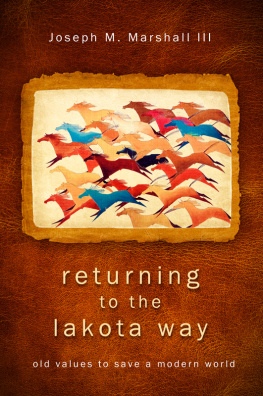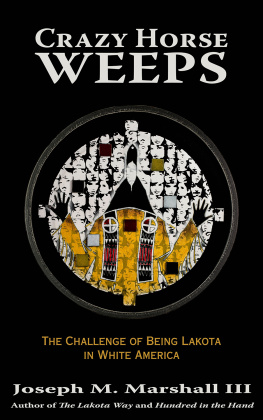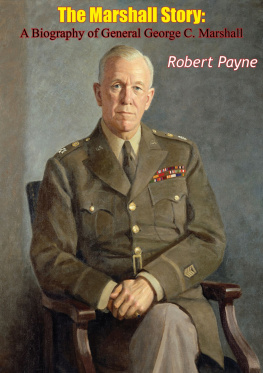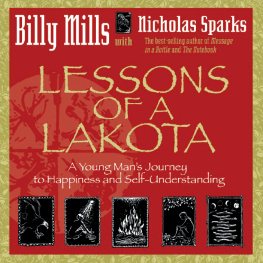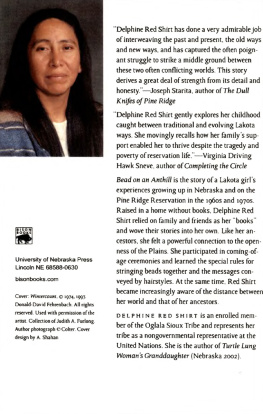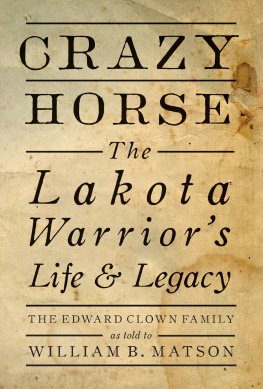Praise for Returning to the Lakota Way
This book is certain to become a classic in Native American literature as well as a guide for anyone who seeks larger spiritual truths. Marshall, a Sicangu elder, is well on his way to becoming an elder for all of America.
Roger Welsch, author of Embracing Fry Bread: Confessions of a Wannabe
In this fine collection of stories, Marshall eloquently delivers some hard truths in a soft package. His message for todays world: we will surely sink beneath the floodwaters of tomorrow if we do not embrace the wisdom of yesterday.
Joseph Starita, author of I Am a Man: Chief Standing Bears Journey for Justice
Joseph Marshall is more than a great storyteller. Hes also a very wise man. In these evocative vignettes from Lakota legend and rich personal experience, he reminds his readers that even in the overstimulated, overstressed 21st century, the greatest peace is to be found in simple, universal values and quiet contemplation.
Kirk Ellis, writer/producer of TNTs Into the West and HBOs John Adams
Through the beautiful teachings of his Lakota elders Joseph Marshall shares with the reader many of lifes truths. He reminds us of the simplicity and the sanctity of life. There are no new magical answers or solutions to lifes mysteries in this collection, but there are certainly powerful lessons that one can choose to embrace. When you read this book you will be motivated to rekindle the person you were when you began this journey.
Judi M. gaiashkibos, an enrolled member of the Ponca Tribe of Nebraska and the executive director of the Nebraska Commission on Indian Affairs?

ALSO BY JOSEPH M. MARSHALL III
The Lakota Way: Stories and Lessons for Living
To You We Shall Return: Lessons About Our Planet from the Lakota
The Day the World Ended at Little Bighorn: A Lakota History
The Power of Four: Leadership Lessons of Crazy Horse
Keep Going: The Art of Perseverance
Hundred in the Hand: A Novel
The Journey of Crazy Horse: A Lakota History
Walking with Grandfather: The Wisdom of Lakota Elders
The Long Knives Are Crying
Winter of the Holy Iron
On Behalf of the Wolf and the First Peoples
How Not to Catch a Fish: And Other Adventures of Iktomi

Copyright 2013 by Joseph M. Marshall III
Published and distributed in the United States by: Hay House, Inc.: www.hayhouse.com Published and distributed in Australia by: Hay House Australia Pty. Ltd.: www.hayhouse.com.au Published and distributed in the United Kingdom by: Hay House UK, Ltd.: www.hayhouse.co.uk Published and distributed in the Republic of South Africa by: Hay House SA (Pty), Ltd.: www.hayhouse.co.za Distributed in Canada by: Raincoast: www.raincoast.com Published in India by: Hay House Publishers India: www.hayhouse.co.in
Cover design: Charles McStravick
Interior design: Nick C. Welch
All rights reserved. No part of this book may be reproduced by any mechanical, photographic, or electronic process, or in the form of a phonographic recording; nor may it be stored in a retrieval system, transmitted, or otherwise be copied for public or private useother than for fair use as brief quotations embodied in articles and reviewswithout prior written permission of the publisher.
The author of this book does not dispense medical advice or prescribe the use of any technique as a form of treatment for physical, emotional, or medical problems without the advice of a physician, either directly or indirectly. The intent of the author is only to offer information of a general nature to help you in your quest for emotional and spiritual well-being. In the event you use any of the information in this book for yourself, which is your constitutional right, the author and the publisher assume no responsibility for your actions.
Library of Congress Cataloging-in-Publication Data
Marshall, Joseph
Returning to the Lakota way : old values to save a modern world / Joseph M. Marshall.
p. cm.
ISBN 978-1-4019-3175-9 (hardcover : alk. paper) 1. Teton IndiansFolklore. 2. TalesGreat Plains. I. Title.
E99.T34M38 2013
398.20978dc23
2012027505
Hardcover ISBN: 978-1-4019-3175-9
16 15 14 13 4 3 2 1
1st edition, November 2013
Printed in the United States of America
To my wife
Connie West Marshall
May 2, 1949 February 14, 2013
You enriched my life and gave it meaning
because you loved me unconditionally.
You inspired me to reach deep into my writers soul.
But most of all
you taught me how to be a good man.
For all of that, and more,
I will always love you.

At the end of his life, when anyone asked Walks Alone how he had been a wise and caring head man for so many years, he always said it was because of his grandmother. Of course, none of those who asked him that question knew his grandmother, since she had died when he was still a young man. So he would tell them the story of the small, quiet woman who was such a powerful influence on him. It began when he was just a boy, and his name was Slow. His grandmothers name was Gray Grass.
Every kind of being that lived on the great northern prairie lands had to be strong in order to survive. Summers were extremely hot and winters were harsh and unforgiving. That meant that every kind of plant, tree, and shrub and every kind of creature that flew, swam, crawled, or walked on four legs or two had to know the ways and whims of Grandmother Earth. Two-leggedsthe peoplewere no different.
The people who lived on the prairie lands made their living by hunting and gathering. They hunted the animals whose flesh provided sustenance, strength, shelter, and comfort, and whose bones gave them weapons and utensils. They also gathered the various fruits and vegetables that grew on the flatlands or along the rivers and streams, such as tubers, berries, wild oats, and peppermint. Life was good for the two-leggeds. But as for all the inhabitants of the land, it was also hard.
When Slow was ten years old, his mother and father were swept away together in a flash flood. They had been on their way to visit her parents in a distant village and had left Slow with his grandparents, so he was taken in by them. But the following winter, tragedy visited the family once again. Slows grandfather, a good and wise man, broke his leg while hunting. He was alone and far from help, and so he froze to death. Therefore, for many years, until Slow took a wife at the age of 20, it was only he and his grandmother in their lodge.
At the age of 12 he proved himself to be a persistent and skilled hunter during a very hard winter when game was scarce. He found a small herd of buffalo after walking for many days in the bone-chilling cold and often hip-deep snow. It was a feat that even the adult hunters in the village would not attempt. The animals he found were enough to feed everyone in his village through the winter. Furthermore, it was his grandmothers advice and planning that had enabled him to travel so far and succeed at his mission.
Gray Grass knew that her grandson was always quiet, hardly talking even in the presence of other children and young people. And she knew why. Life had been hard on him and he had much to contemplate. Some of the other adults worried that he was too quiet. They wondered if the tragedies the boy had suffered might be too much to bear. The old woman, though, was glad for the boys silence. She knew he sought solitude for the peace that it brought. After all, they had suffered heartbreak together. Though they had relatives in this village and another, each was really all the other had for support to face each days trials and tribulations. So when anyone spoke about the boys tendency to be alone and quiet, whether as worry or as criticism, she took such comments with a polite smile. As one who had lived a long life and endured much herself, she knew the healing value of silence. As for Slow, he trusted his grandmother without question.
Next page
